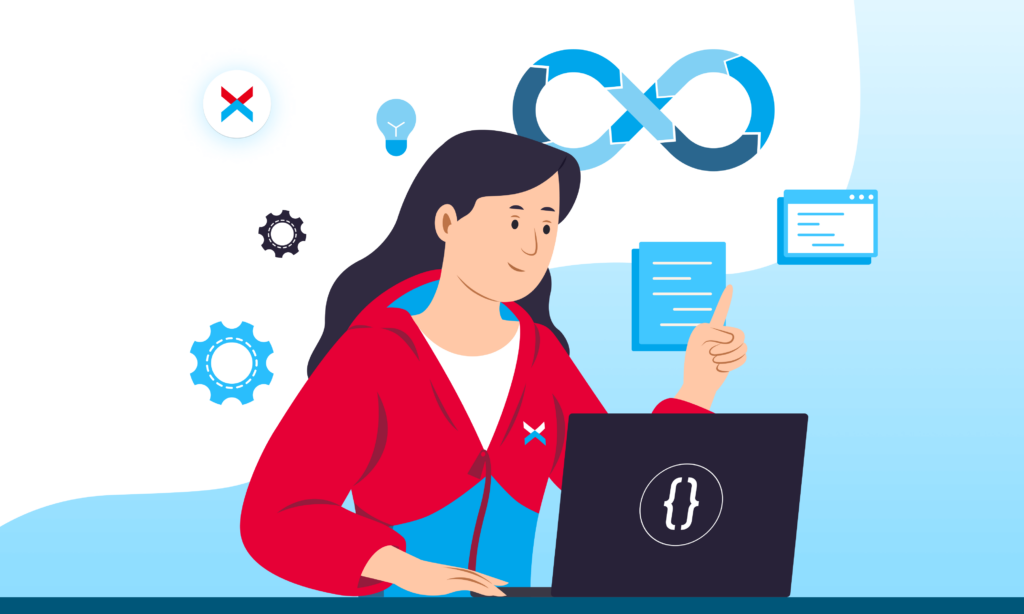Many newcomers to the IT industry often need a clearer understanding of the roles and responsibilities of DevOps engineers. Even those embarking on their careers in this field frequently find it challenging to showcase their comprehension. Drawing from our extensive experience conducting numerous interviews at NIX, we’ve created this article to assist beginners in thoroughly preparing for a Junior DevOps engineer position job interview. Here, you will also find insights into the most common DevOps interview questions for beginners and the best ways to answer them effectively.
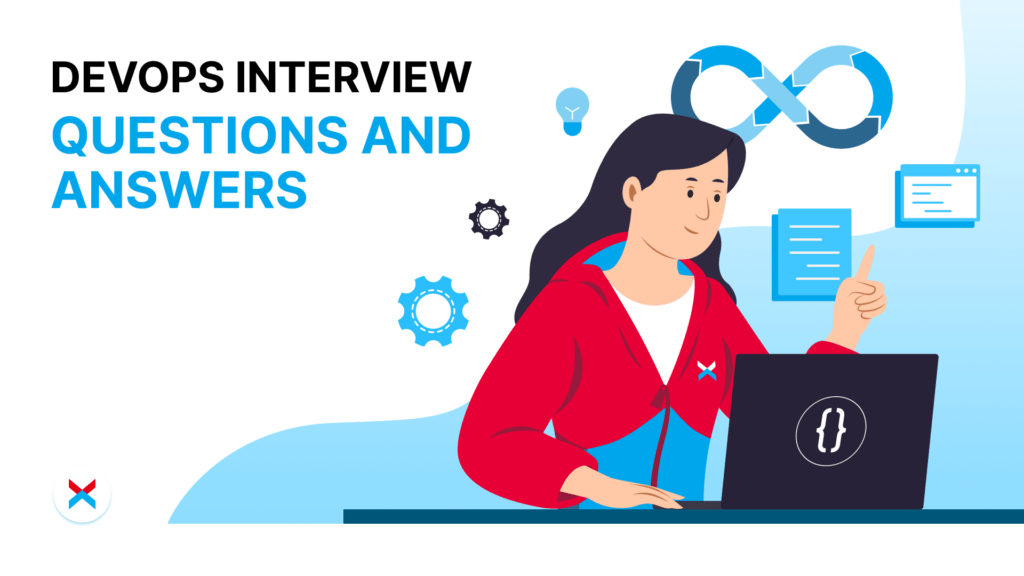
How do I start preparing for a DevOps interview?
To start preparing for a DevOps beginner interview, embracing a mindset of continuous learning and adaptability is crucial. In DevOps, you’ll encounter a dynamic landscape filled with the latest technologies, diverse methodologies, and a multitude of applications and tools. The field of DevOps necessitates staying updated with current trends and advancements in the DevOps world, especially when addressing DevOps interview questions.
A genuine passion for the profession is foundational. It fuels your motivation to delve into new technologies and master various approaches. Keeping abreast of emerging trends not only demonstrates your commitment but also enhances your ability to contribute effectively in a DevOps role. Being prepared to answer DevOps interview questions for beginners will also help you showcase this enthusiasm.
It’s important to note that the technology stack in DevOps differs significantly from traditional development technologies. While development skills are valuable, DevOps engineers require versatile skills that span across infrastructure management, automation, continuous integration and delivery (CI/CD), containerization, and more. This versatility allows them to navigate diverse projects and environments seamlessly.
Despite the vast array of technologies and tools, the core principles of DevOps remain constant—automation, collaboration, continuous improvement, and delivering value to stakeholders efficiently and reliably. Understanding these principles and how they apply to real-world scenarios is crucial for success in DevOps roles.
The demand for DevOps specialists continues to rise steadily as businesses expand their IT infrastructures and adopt cloud services. DevOps is instrumental in enabling scalable and resilient systems that support modern business needs. However, due to the field’s youth and rapid evolution, the pool of experienced DevOps experts remains relatively small. This scarcity presents an opportunity for individuals passionate about DevOps to make a significant impact and carve out a rewarding career path.
In preparation for DevOps interview questions, focus on gaining hands-on experience with essential tools like Jenkins, Docker, Kubernetes, Ansible and cloud platforms like AWS, Azure, or Google Cloud.
Engage with DevOps communities, participate in forums, and attend webinars to broaden your knowledge and network with industry professionals. Additionally, consider pursuing relevant certifications to validate your skills and enhance your credibility as a DevOps practitioner.
By proactively expanding your skill set, staying informed about industry trends, and demonstrating a commitment to continuous learning, you’ll position yourself as a strong candidate ready to tackle any DevOps interview questions and excel in the dynamic field of DevOps.
What to Highlight in Your Resume
We prioritize several key aspects when reviewing candidates for a DevOps engineer position.
First and foremost, we value stability. We look for candidates who have demonstrated long-term commitment to their previous DevOps teams. It indicates reliability and the ability to integrate well within our DevOps team over time. Make sure to indicate your previous relevant jobs in your resume, as this can help you effectively address DevOps interview questions for beginners.
Next, we emphasize practical experience with specific technologies. We want to see the technologies you have worked with and the depth of your understanding and expertise. Demonstrating your proficiency and level of expertise in these technologies is crucial.
Proficiency in conversational English is also highly important in software development teams. Our DevOps engineers frequently communicate with foreign clients and developers, making strong English skills essential. It has become a standard requirement in the industry and is beneficial for any team.
To ensure your resume stands out, we recommend checking out our expert material on the most common mistakes made in a CV. By following these recommendations, you can present a polished and compelling resume that effectively showcases your qualifications, aligning with the priorities we seek in a DevOps engineer candidate.
DevOps Interview Questions for Beginners
To become DevOps engineers, candidates must undergo certain professional development stages. It is incredibly challenging to learn automation, infrastructure settings, and application deployment right away. First, they need to be able to create all these manually. Only then will they understand how everything works under the hood. Learning a new tool will not be a problem in the future since they know the process’s nature, not just the buttons in a fancy tool.
In evaluating candidates, we take a comprehensive approach, considering various factors beyond technical skills. Our aim is not to rely on rigid DevOps interview questions for beginners that immediately dictate the interview’s outcome. Instead, we conduct thorough interviews to assess whether candidates possess the necessary skills or if there are areas where they need further development.
Interestingly, many candidates struggle with basic questions such as:
- How do I rename a file using the console?
- Where can logs be viewed in Linux?
- How do you search for packages in a repository?
These challenges stem from a lack of understanding about how solutions found online actually work. Thus, it’s important to be well-prepared for these basic questions too. Demonstrating a curiosity about the mechanics behind solutions showcases professional interest and a strong learning capacity.
To assist you in preparing for your DevOps job interview, we have compiled a selection of top DevOps interview questions for beginners and answers to these questions. These DevOps interview questions cover essential topics to help you grasp fundamental concepts and prepare effectively for your interview.
DevOps Technical Interview Questions
When interviewing beginners, hiring managers typically focus on understanding their foundational knowledge and problem-solving capabilities. They may inquire about the programming languages and technologies the candidate is familiar with and their approach to tackling technical challenges.
Emphasis is placed on assessing the candidate’s enthusiasm for learning and ability to grasp new concepts effectively. To help you get started, we have compiled a collection of the most common DevOps interview questions and answers.
1. What is DevOps?
DevOps represents a transformative approach within the IT landscape, blending the disciplines of software development (Dev) and IT operations (Ops) into a unified culture. Although relatively new in the industry, DevOps is often described as “IT for IT,” emphasizing its role in optimizing the efficiency and effectiveness of IT processes.
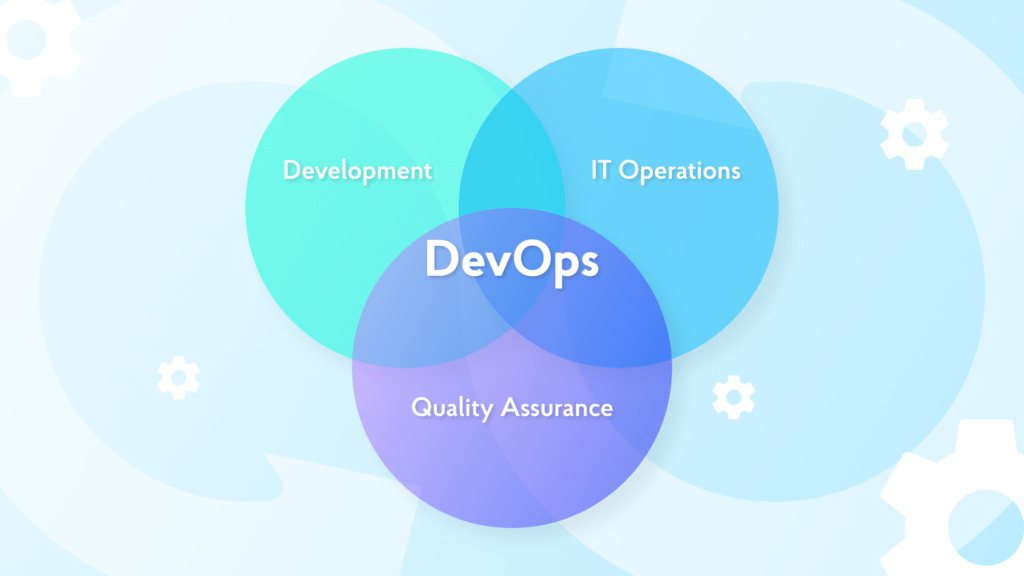
At its core, DevOps aims to shorten the systems development lifecycle by promoting continuous integration, continuous delivery, and continuous deployment practices. By automating repetitive tasks and workflows, DevOps enhances productivity and minimizes errors, thereby ensuring a smoother and more reliable software release process.
Moreover, DevOps fosters a collaborative environment where cross-functional teams—developers, testers, and operations personnel—work closely throughout the entire software development lifecycle. This collaboration accelerates the pace and enables continuous delivery of high-quality software.
DevOps is not merely about tools and technologies but also about fostering a cultural shift that values communication, feedback loops, and continuous improvement. By embracing DevOps principles, organizations can achieve greater agility, responsiveness to customer needs, and sustained innovation in today’s competitive market.
2. What is the DevOps Lifecycle?
The DevOps lifecycle includes the following phases:
- Planning: Defining project requirements and scope.
- Development: Writing and testing code.
- Integration: Merging code changes into a shared repository.
- Testing: Automated testing to ensure code quality.
- Deployment: Releasing the code to production.
- Monitoring: Continuous monitoring and logging to ensure system health.
- Feedback: Collecting and analyzing user feedback for improvements.
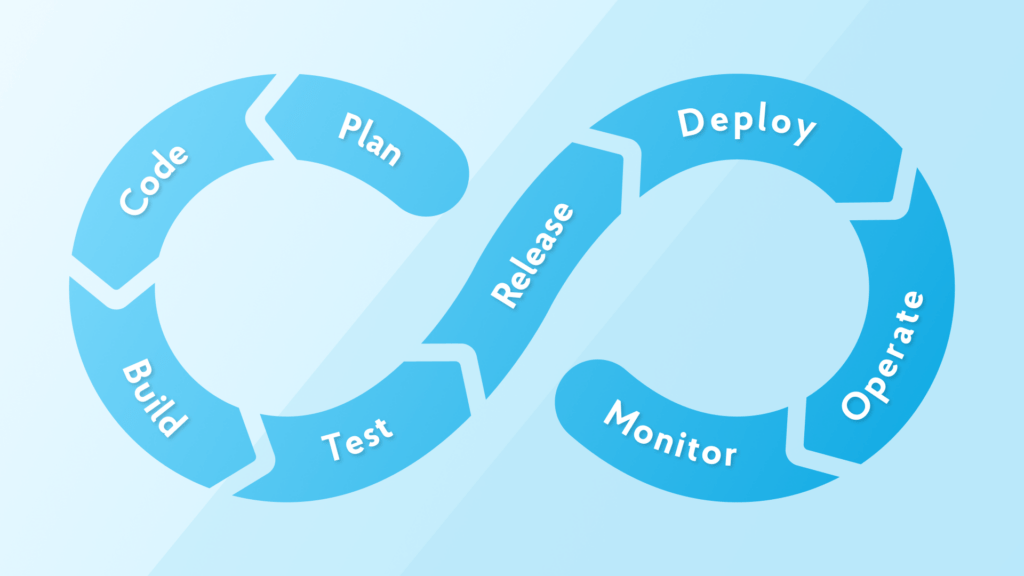
3. Why is DevOps Important?
DevOps is essential because it improves collaboration and communication between development and operations teams, speeds up the delivery of software products, enhances the quality and reliability of software releases, and allows for faster recovery from failures.
4. List the Key Components of DevOps
- Continuous Integration (CI)
- Continuous Delivery (CD)
- Infrastructure as Code (IaC)
- Monitoring and Logging
- Collaboration and Communication
- Automation
5. What’s the Difference Between Continuous Delivery and Continuous Deployment?
- Continuous Delivery: Ensures that the codebase is always in a deployable state. Deployment to production requires manual approval.
- Continuous Deployment: Automates the deployment process, releasing changes to production automatically without manual intervention.
6. Explain the difference between Agile and DevOps
- Agile: Focuses on iterative development and collaboration between cross-functional teams. It emphasizes adaptive planning and continuous improvement.
- DevOps: Extends Agile principles to include IT operations. It focuses on continuous delivery, automation, and improving collaboration between development and operations teams.
7. List the KPIs in DevOps
- Deployment Frequency
- Lead Time for Changes
- Mean Time to Recovery (MTTR)
- Change Failure Rate
- Availability
8. Name Some Commonly Used DevOps Tools
- Version Control: Git, SVN
- CI/CD: Jenkins, CircleCI, Travis CI
- Configuration Management: Ansible, Puppet, Chef
- Containerization: Docker, Kubernetes
- Monitoring and Logging: Prometheus, Grafana, ELK Stack
- Collaboration: Jira, Confluence, Slack
9. Can DevOps be Classified as a Tool?
No, DevOps is not a tool but a set of practices and a cultural approach that involves using various tools to automate processes and improve collaboration between teams.
10. List Some Cloud Platforms That are Used for DevOps Implementation
- Amazon Web Services (AWS)
- Microsoft Azure
- Google Cloud Platform (GCP)
- IBM Cloud
- Oracle Cloud
11. List the Phases of DevOps
- Planning
- Development
- Integration
- Testing
- Deployment
- Monitoring
- Feedback
12. List the Challenges Involved with Implementing DevOps
- Cultural Resistance
- Legacy Systems
- Lack of Skilled Personnel
- Tool Integration
- Security Concerns
- Managing Change
13. Explain the Primary Services of DevOps
- Continuous Integration and Continuous Deployment (CI/CD)
- Infrastructure as Code (IaC)
- Automated Testing
- Configuration Management
- Monitoring and Logging
- Collaboration and Communication Tools
14. Can DevOps be Considered as an Agile methodology?
DevOps is not an Agile methodology, but it complements Agile principles. While Agile focuses on development, DevOps integrates development and operations to ensure a seamless flow from development to production.
15. Explain ways by Which DevOps Can be a Complement to Agile Methodology
- Continuous Feedback: Enhances Agile’s iterative approach with constant monitoring and feedback.
- Faster Releases: Supports Agile’s quick release cycles with automated deployment.
- Improved Collaboration: Extends Agile’s team collaboration to include operations, ensuring end-to-end responsibility.
16. What is Automation Testing?
Automation testing is the use of software tools to execute pre-scripted tests on a software application before it is released into production. It aims to reduce manual intervention, increase test coverage, and improve the accuracy and efficiency of testing.
17. What is Continuous Testing, and How is it Different From Automation Testing?
Continuous Testing is an essential practice within the DevOps methodology that ensures software quality throughout the entire software development lifecycle. Unlike traditional testing approaches that occur at the end of the development cycle, Continuous Testing integrates testing activities early and often, aiming to provide immediate feedback on code changes.
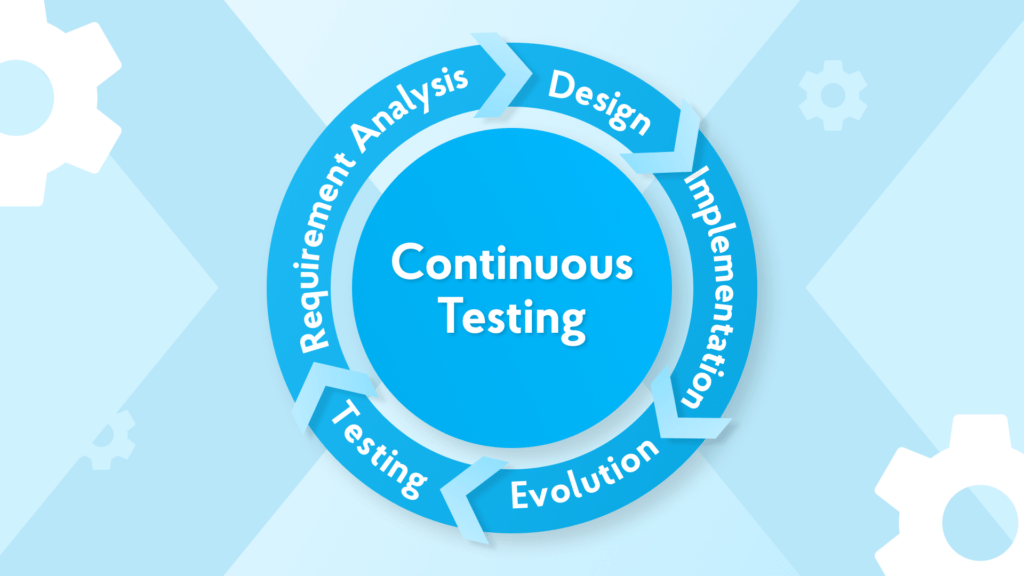
Continuous Testing differs from Automation Testing in several key ways:
- Integration into CI/CD Pipeline: Continuous Testing is seamlessly integrated into the CI/CD pipeline, where automated tests are executed continuously as code changes are made. This allows for rapid identification of defects and ensures that quality standards are maintained throughout the development process.
- Scope and Timing: Automation Testing focuses primarily on automating manual test cases to increase efficiency and reduce human error. It typically involves automating functional and regression tests executed at specific intervals, such as during nightly builds or before significant releases. In contrast, Continuous Testing encompasses a broader scope of testing activities, including unit tests, integration tests, API tests, performance tests, and security tests, executed continuously and in parallel with development activities.
- Feedback Loop: Continuous Testing emphasizes providing immediate feedback to developers and stakeholders. Test results are reported in real-time, enabling teams to detect and address issues early in the development cycle. This rapid feedback loop accelerates the identification and resolution of defects, reducing the cost and effort associated with fixing problems later in the process.
- Shift-left Approach: Continuous Testing promotes a shift-left approach, where testing activities are moved earlier in the SDLC (Software Development Lifecycle). By integrating testing from the beginning of development, teams can proactively prevent defects and ensure quality is built into the software from the outset.
In summary, while Automation Testing focuses on automating manual test cases to improve efficiency, Continuous Testing extends beyond automation to encompass a holistic approach to testing integrated into the CI/CD pipeline. It emphasizes early and continuous feedback, comprehensive test coverage, and proactive defect prevention, ultimately enhancing the quality, reliability, and speed of software delivery in DevOps environments.
18. Can You Describe the Process for Securing Application Containers in a DevOps Environment?
Securing application containers in a DevOps environment is crucial for maintaining cybersecurity. The process typically starts with selecting a secure container image. Integrated into a continuous development pipeline, vulnerability scans, and image signing are essential steps to ensure the integrity of container images.
Access control measures are then implemented to mitigate risks associated with potentially compromised devices. Robust security checks are imperative throughout the lifecycle to safeguard container security effectively.
19. Can You Describe the Role of Security in a DevOps Environment?
Security plays a critical role in ensuring that software applications and systems are protected throughout their lifecycle. Here are critical aspects of security in DevOps:
In DevOps, security is integrated into every phase of the software development lifecycle, from planning and coding to testing, deployment, and operations. This approach, known as DevSecOps, emphasizes proactive security measures rather than addressing vulnerabilities as an afterthought.
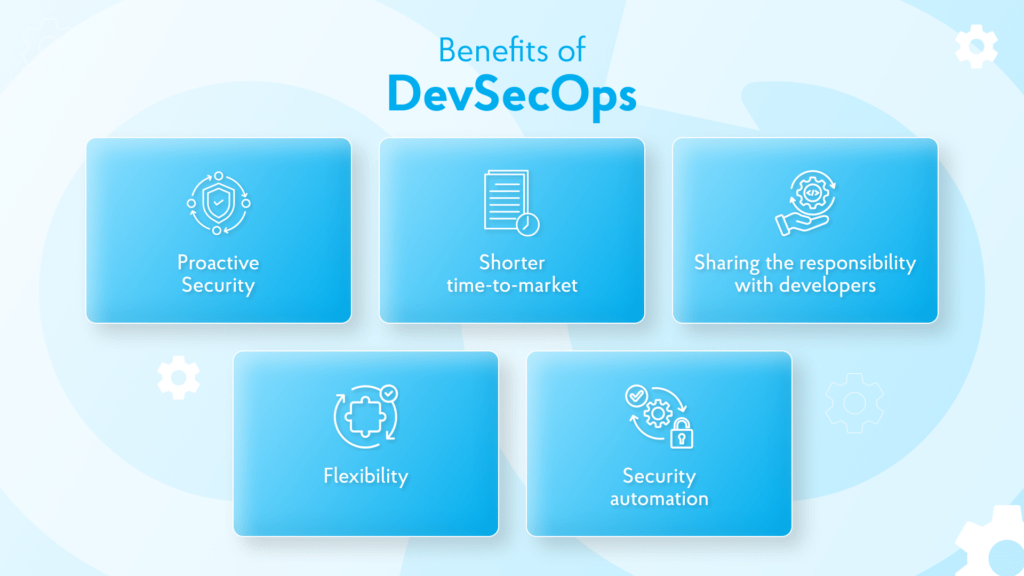
DevOps promotes continuous monitoring of applications and infrastructure to promptly detect and respond to security incidents. Monitoring tools provide real-time visibility into system behavior, allowing teams to detect anomalies, unauthorized access attempts, or potential breaches. Automated responses and incident response plans help swiftly mitigate the impact of security incidents.
General DevOps Interview Questions
Following discussions on your understanding of DevOps concepts and practices, hiring managers often shift to inquire about your practical experience. They are keen to learn about the programming languages and tools you have worked with, your problem-solving skills, and your dedication to continuous learning, especially when it comes to to answering DevOps interview questions.
1. What Programming Languages do You Use?
Typically, young DevOps engineers are not required to write code—at least not initially. However, programming skills can be handy for a DevOps specialist when automating administrative tasks such as deploying applications, setting up environments, or managing overall infrastructure.
This question allows you to showcase your familiarity with various programming languages commonly used in DevOps. DevOps Engineers usually use several programming languages, including Python, Bash, and Go. It is also beneficial to mention any languages listed in the job description that align with your skills.
2. What DevOps Tools Have You Worked With?
This is one of the most common DevOps interview questions. When answering, refer to the job description for the company’s specific tools and match them with your experience. Commonly used DevOps tools include:
- CI/CD: Jenkins, GitLab CI
- Version Control: Git, GitHub, Gitlab
- Configuration Management: Ansible, Chef
- Containerization: Docker, Kubernetes
- Monitoring: Prometheus, Grafana, ELK Stack
Be honest about your experience with these tools, as follow-up DevOps interview questions may explore your familiarity with them.
3. Talk about a project You Completed Successfully
Share details about a recent project where you made a significant impact. Highlight your role, the tools you used, and the outcomes achieved. This question helps interviewers assess your problem-solving skills and ability to work collaboratively. Focus on how you interacted with team members and overcame challenges. Examples can come from professional experience, academic projects, volunteer work, or extracurricular activities.
4. How Do You Keep Your Skills Sharp and Up to Date?
As the demand for skilled DevOps engineers continues to grow, it’s essential to stay updated with the latest industry trends and practices. At DevOps beginner interviews, hiring managers look for candidates who are proactive about learning and skill development. Discuss any personal projects, open-source contributions, or courses you’re taking to stay up to date.
Recommended ways to keep your skills current include:
- Continuous Learning: Enrolling in online courses and certifications.
- Reading: Following industry blogs, forums, and publications.
- Networking: Attending conferences, meetups, and participating in webinars.
- Hands-On Practice: Experimenting with new tools and technologies in personal projects or lab environments.
By tailoring your responses to these questions, you can effectively demonstrate your technical skills, practical experience, and commitment to continuous learning in the field of DevOps.
Essential Knowledge for Starting in DevOps
- Understanding the general structure of the Linux operating system and the organization and purpose of directories in the OS.
- Knowledge of user permissions, groups, and access rights settings.
- Skills in working with texts, files, process management, service management, network configuration, time management, disks, and basic bash understanding.
- Experience with package managers CentOS/Ubuntu and installing packages from source.
- Understanding the principles of how the internet works.
- Practical skills in installing and configuring web servers like Nginx and Apache.
- Experience with CMS systems such as WordPress, Joomla, and Drupal.
- Understanding the principles and organization of MySQL database management systems, ability to make SQL queries, backup, and restore databases.
- Knowledge of email principles, the purpose of mail protocols, and experience setting up postfix/exim+dovecot+roundcube.
- Understanding DNS principles, types of resource records, and their purpose.
- Good skills with at least one popular cloud provider: AWS, or Azure, or Google Cloud.
- A clear understanding of the CI/CD approach and practical skills using CI/CD tools.
- Experience with containerization tools, particularly Docker, and understanding the problems this technology solves.
These skills will help demonstrate the necessary preparation level for a beginner. However, it can also be improved. Knowledge of configuration management tools (e.g., Ansible) and infrastructure management tools (e.g., Terraform) is desirable in many teams. Additionally, familiarity with and experience implementing best practices in all these areas is a big plus.
If you are just starting out in DevOps, we recommend signing up for our FREE DevOps/Linux Administrator Course.
For those with knowledge and commercial experience, our middle DevOps engineer job offers exciting opportunities to further your career. Experienced professionals can explore our senior DevOps engineer vacancy for a chance to take on more challenging and rewarding projects.
Resources To Prep for DevOps Beginner Interview
To prepare effectively for a DevOps beginner interview and tackle common DevOps interview questions, applicants should immerse themselves in technical materials, ensuring they understand every detail. It involves studying core DevOps concepts, familiarizing themselves with CI/CD pipelines, version control systems, and cloud computing, learning about automated testing tools, and grasping the principles of continuous integration and continuous delivery.
Before the interviews, attending workshops and webinars can also be highly beneficial. These events offer the opportunity to learn from industry experts, gain insights into the latest DevOps trends, and ask questions in real-time. For example, we recently hosted a DevOps webinar and are planning to organize more in the future. Participating in these sessions can provide you with valuable knowledge and practical tips, further strengthening your readiness for DevOps interview questions.
Additionally, hands-on practice with popular DevOps tools and platforms, such as Jenkins, Docker, Kubernetes, and Ansible, can be highly beneficial. To simplify this process, we’ve collected the most valuable resources to guide your studies and help you build a strong foundation.
Understanding these topics deeply will boost your confidence and significantly increase your chances of receiving that coveted job offer. A firm grasp of DevOps fundamentals and practical skills will set you apart from other candidates. So, invest the time and effort into your preparation, and you’ll be well on your way to success in your DevOps career journey! This will also help you excel in answering DevOps interview questions and preparing for DevOps interview questions you may encounter.
Linux:
Web Articles:
- Linux basics:
- Terminal text editors:
- Shell:
- Networking:
- 7 Linux networking commands that every sysadmin should know | Red Hat (ip, ifconfig, mtr, tcpdump, netstat, nslookup, ping)
- Network Configuration | Ubuntu
- How to Configure Network Settings on CentOS 7 Using the Terminal | phoenixNAP
- Disk Management:
- Directory structure:
- Permissions:
- Linux Users and Groups | Linode (id, groups, usermod, useradd, passwd, adduser, userdel, visudo, newgrp, chmod, chown)
- Linux File Permissions and Ownership Explained with Examples | Linux Handbook (chmod, chown)
- Sticky Bit, SUID and SGID in Linux with Examples | LinOxide (chmod)
- Sudo Command in Linux | Baeldung (sudo, su)
- Package management:
- Web server setup – LAMP, LEMP:
Udemy Courses:
- Linux:
- Bash:
- Web server setup – LAMP, LEMP:
YouTube Channels/Playlists/Videos:
- Linux Server Course – System Configuration and Operation
- DJ Ware – YouTube
- Linux Command Line Tutorial For Beginners
- Linux Full Course In 5 Hours | Linux Tutorial For Beginners | Linux Training | Edureka
- Linux Training for Beginners | Linux Tutorial For Beginners | Intellipaat
- What is a LAMP Stack?
- How to Install an Apache LAMP Server on Ubuntu 20.04 (in 5 minutes)
- How to Install a LEMP Server on Ubuntu 20.04 (in 5 minutes)
Books:
- UNIX and Linux System Administration Handbook – Trent R. Hein, Evi Nemeth, Garth Snyder, Ben Whaley, Dan Mackin
- The Practice of System and Network Administration – Thomas A. Limoncelli, Christina J. Hogan, Strata R. Chalup
- How Linux Works – Brian Ward
- Linux Phrasebook – Scott Granneman
- The Linux Command Line: A Complete Introduction – William E. Shotts, Jr.
- Linux Pocket Guide – Daniel J. Barrett
- Wicked Cool Shell Scripts – Dave Taylor
- Bash Pocket Reference – Arnold Robbins
General Introduction to DevOps:
Official Documentation/Manuals:
- https://aws.amazon.com/devops/what-is-devops/
- https://docs.aws.amazon.com
- https://learn.microsoft.com/azure/
- https://cloud.google.com/docs/
- https://docs.gitlab.com/ee/ci/
- https://docs.docker.com/get-started/overview/
- https://kubernetes.io/docs/concepts/overview/
- https://www.terraform.io/intro/index.html
- https://www.ansible.com/overview/how-ansible-works
- https://www.atlassian.com/devops/what-is-devops/devops-engineer
Web Articles:
- https://www.mindk.com/blog/devops-strategy/
- https://git-scm.com/book/en/v2/Getting-Started-What-is-Git%3F
- https://www.edureka.co/blog/what-is-jenkins/
- https://medium.com/devgurus/continuous-code-quality-and-automated-code-review-tools-aa911dd1b263
- https://www.bmc.com/blogs/kubernetes-helm-charts/
- https://www.simplilearn.com/tutorials/aws-tutorial/aws-cloudformation
Udemy Courses:
- Introduction to Devops – 90 Minute Crash Course | Udemy
- DevOps , CI/CD(Continuous Integration/Delivery for Beginners | Udemy
- Introduction to Continuous Integration & Continuous Delivery | Udemy
- Gitlab CI Pipelines, CI/CD and DevOps for Beginners Tutorial | Udemy
- Learn DevOps: Docker, Kubernetes, Terraform and Azure DevOps | Udemy
- The DevOps Essentials – The Handbook | Udemy
- AWS Cloud Practitioner (CLF-C01) | Complete AWS Introduction | Udemy
- Ultimate AWS Certified Solutions Architect Associate (SAA) | Udemy
